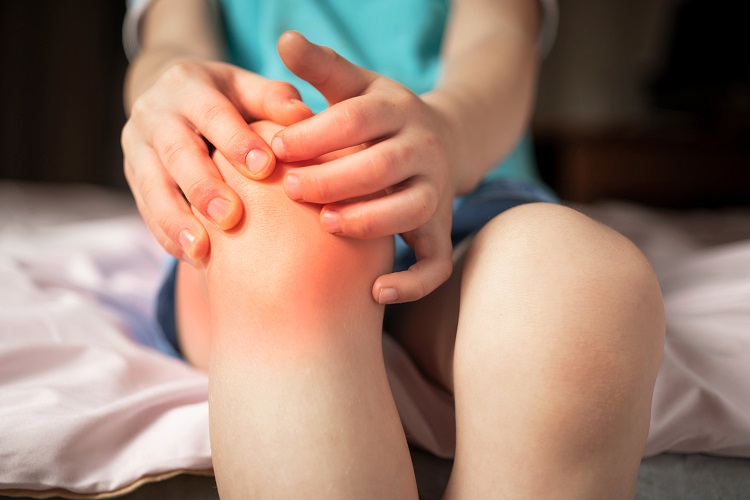A 15-year-old girl from Hyderabad who was recently diagnosed with juvenile idiopathic arthritis visited the OPD at Sree Subramania Ayurveda Hospital in Calicut complaining of pain, stiffness and swelling in her joints. She was intolerant to the cold since childhood. The discomfort began in her legs and palm digits at first. In addition to the pain, there were a few skin rashes with itching in the right forearm, and lowerback that subsided spontaneously. This painful condition disturbed her functional activities, such as playing games, writing etc.. The sickness gradually began spreading to the knee joints as well. There were frequent flare-ups of the illness. She had a family history of rheumatoid factor positivity. Her parents took her to a rheumatologist, tests for ANA, RA factor, ESR, and anti-CCP were performed, and the results were clinically linked to juvenile idiopathic arthritis. The methotrexate and NSAIDs prescribed by the Rheumatologist provided symptomatic relief. Then they approached Dr Sanand From SSANH for proper management. Inflammation was detected in the joints during examination, including swelling, discomfort, tenderness, and limited range of motion. The patient was admitted to the hospital for 22 days. Gradually her symptoms improved and after the 4th-month follow-up,
she was absolutely symptom-free and had significant changes in the laboratory investigation reports.
Lab investigations
| Sl.No | Parameter | Value | Normal limit |
|---|---|---|---|
| 1 | RA factor | 19 IU/mL | 0-14 IU/mL |
| 2 | ESR | >40 mm | 0-15mm |
| 3 | Anti-CCP | Normal (15u/ml) | 0-20u/mL |
| 4 | CRP | 7mg/L | 0-5 mg/L |
Internal medicine
- Amrutharishta +punarnavasava
- Drakshadi panam
- Ashtachoornam with hot water
- Nimbamrutadi eranda at bedtime
External therapy
- Rasna aswagandhadi pinda sweda for 14 days
- Dashamoola dhara for 8 days
Diet and lifestyle modifications
- Advised light, hot food items, red variety of rice, millet
- Include leafy vegetables, garlic, ginger, buttermilk in the diet
- Avoid junk, bakery products, cold, heavy
- Avoid meat, seafood, fish, curd, prolonged use of black
- Avoid holding of natural urges, day sleep
(Note* This is a specialized plan for a specific disease, please do not try it at home without the supervision of an Ayurvedic Doctor)
Discharge medicine
- Drakshadi panam
- Pachanamrutham kashayam
- Hinguvachadi choornam
- Kaseesa kalpa with lemon and honey
- Ashtachoornam
- Nimbamrutadi eranda thaila
1st followup –No flaring up of symptoms
- Pachanamrutham kashayam
- Amalaka rasayana+kaseesa kalpa
- Hinguvachadi choornam
- Nimbamrutadi erandam
Medicines continued for 3 months.
Improvement assessment table
| Sl.No | Parameters | Before treatment (Day 1st) | Relief In between treatment | After treatment (22nd day) | Follow-up (After 2 months) |
|---|---|---|---|---|---|
| 1 | Severity of pain | Moderate | 80% | 100% | 100% |
| 2 | Tenderness | Moderate | 60% | 100% | 100% |
| 3 | Swelling | Moderate | 70% | 100% | 100% |
| 4 | Reddish discolouration | Present | Absent | Absent | Absent |
| 5 | Functional ability | Mildly painful | Not painful | Within normal | Within normal |
| 6 | CRP | 7mg/dl | – | – | Negative |
| 7 | ESR | 40mm | 22mm | Negative | Negative |
Juvenile Idiopathic Arthritis (JIA)
The most prevalent type of arthritis in children is JIA. Specifically in the hands, knees, elbows, and legs, it causes pain and inflammation in the joints. Idiopathic simply means unidentified.signifies that it is uncertain about the cause of this disease. It appears to be an autoimmune and autoinflammatory pathophysiology, as well as a genetic predisposition.
Classification
- Oligoarticular JIA
- Polyarticular JIA
- Enthesis related JIA
- Psoriatic JIA
- Undifferentaiated JIA
- Systemic JIA
What are the Symptoms?
- Joint manifestation like pain,tenderness,stiffness,swelling,
- Sometimes Eye manifestation
- Skin Manifestation like psoriatic skin lesions,nail pits,inflammation or swelling of fingers or
- High fever
- Rash
How to diagnose JIA?
- High ESR and CRP levels
- Positive Antinuclear antibody
- Positive Rhematoid factor
- HLAB27
- Complete blood count
JIA Management in Ayurveda
Ayurveda compares the concept of autoimmunity with Aama and considers JIA as Aamavata. The line of management includes both internal and external therapies that include panchakarma purificatory procedures like shodana etc. Diet and lifestyle modification play an important role in preventing the recurrence of any arthritis even after the specified period of hospitalised treatment. SSANH follow a holistic and personalised approach to diseases.Consult with knowledgeable doctors at SSANH to begin your arthritis therapy and learn more about the Ayurvedic method of treating juvenile idiopathic arthritis.



